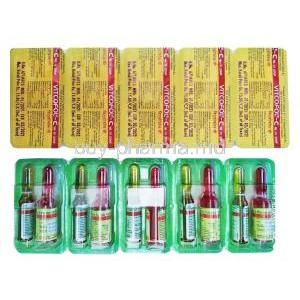Dextrose
Uses
Dextrose is used in short term fluid replacement after trauma.
How it Works
Dextrose is a large molecular weight substance. Dextrose remains restricted to the blood vessels and generates oncotic pressure which means it generates pressure produced by proteins in the blood.
Common Side effects
Some of the potential side effects of Dextrose include the symptoms below;
Thrombophlebitis
Sodium citrate
Uses
Sodium Citrate is used in the treatment of cough.
How it Works
Sodium citrate works to thin and loosens the mucus secretions in the nasal passageways, thus making it easier to cough out, relieving the cough.
Common Side effects
Some of the potential side effects of Sodium citrate include the symptoms below;
Diarrhea,
Fluid loss.
Sodium Chloride
Uses
Sodium Chloride is used as a short term fluid replacement for uses after trauma, dehydration and irrigation solution for eye or the nose.
How it Works
Sodium Chloride works by increasing the blood volume and also replacing the fluid loss by the body.
Common Side effects
Some of the potential side effects of Sodium Chloride can include the symptoms below;
Nausea,
Vomiting,
Diarrhea,
Muscular twitching
Potassium Chloride
Uses
Potassium Chloride is used for the treatment of potassium deficiency and also Electrolyte imbalance.
How it Works
Potassium Chloride helps with nerve conduction, muscle contraction, kidney function and the heart beating to treat the symptoms. Potassium Chloride also provides essential nutrients for nutritional deficiency
Common Side effects
Some of the potential side effects of Potassium Chloride can include the symptoms below;
Stomach pain,
Chest pain,
Anxiety,
Confusion,
Diarrhoea,
Altered heart rate,
Black and bloody stools,
Muscle weakness,
Muscle paralysiss,
Nausea,
Vomiting,
Allergic reaction,
Cardiac toxicity

















